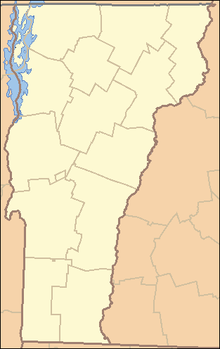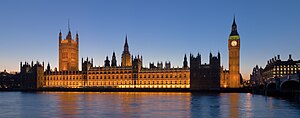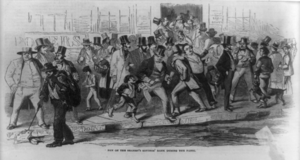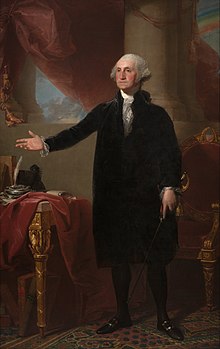| Main | Topics and categories | Tasks and projects |
The Politics portal
Politics (from Ancient Greek πολιτικά (politiká) 'affairs of the cities') is the set of activities that are associated with making decisions in groups, or other forms of power relations among individuals, such as the distribution of resources or status. The branch of social science that studies politics and government is referred to as political science.
It may be used positively in the context of a "political solution" which is compromising and non-violent, or descriptively as "the art or science of government", but also often carries a negative connotation. The concept has been defined in various ways, and different approaches have fundamentally differing views on whether it should be used extensively or in a limited way, empirically or normatively, and on whether conflict or co-operation is more essential to it.
A variety of methods are deployed in politics, which include promoting one's own political views among people, negotiation with other political subjects, making laws, and exercising internal and external force, including warfare against adversaries. Politics is exercised on a wide range of social levels, from clans and tribes of traditional societies, through modern local governments, companies and institutions up to sovereign states, to the international level.
In modern nation states, people often form political parties to represent their ideas. Members of a party often agree to take the same position on many issues and agree to support the same changes to law and the same leaders. An election is usually a competition between different parties.
A political system is a framework which defines acceptable political methods within a society. The history of political thought can be traced back to early antiquity, with seminal works such as Plato's Republic, Aristotle's Politics, Confucius's political manuscripts and Chanakya's Arthashastra. (Full article...)
Selected article
The Latin American Boom (Boom latinoamericano) was a literary movement of the 1960s and 1970s when the work of a group of relatively youthful Latin American novelists became widely circulated in Europe and throughout the world. The Boom is most closely associated with Julio Cortázar of Argentina, Carlos Fuentes of Mexico, Mario Vargas Llosa of Peru, and Gabriel García Márquez of Colombia; but it also brought fame to older writers like Jorge Luis Borges, Pablo Neruda and Ernesto Sábato. Influenced by European and North American Modernism, but also by the Latin American Vanguardia movement, these writers challenged the established conventions of Latin American literature. Their work is experimental and, owing to the political climate of the Latin America of the 1960s, often very political. "It is no exaggeration", critic Gerald Martin writes, "to state that if the Southern continent was known for two things above all others in the 1960s, these were, first and foremost, the Cuban Revolution and its impact both on Latin America and the Third World generally, and secondly, the Boom in Latin American fiction, whose rise and fall coincided with the rise and fall of liberal perceptions of Cuba between 1959 and 1971." The sudden success of the Boom authors was in large part because their works were among the first Latin American novels to be published in Europe, by publishing houses such as Barcelona's avant-garde Seix Barral in Spain. Indeed, Frederick M. Nunn writes that "Latin American novelists became world famous through their writing and their advocacy of political and social action, and because many of them had the good fortune to reach markets and audiences beyond Latin America through translation and travel—and sometimes through exile."
Featured picture

The western (front) side of the United States Capitol. The U.S. Capitol serves as the location for Congress, the legislative branch of the U.S. federal government. It is located in Washington, D.C., on top of Capitol Hill at the east end of the National Mall. The building is marked by its central dome above a rotunda and two wings. It is an exemplar of the Neoclassical architecture style.
Selected quote
Selected biography
Barack Obama (born August 4, 1961) is the 44th President of the United States. He is the first African American to hold the office. Born in Honolulu, Hawaii, Obama is a graduate of Columbia University and Harvard Law School, where he was president of the Harvard Law Review. He served three terms representing the 13th District in the Illinois Senate from 1997 to 2004, running unsuccessfully for the United States House of Representatives in 2000. He began his presidential campaign in 2007, and in 2008, after a close primary campaign against Hillary Clinton, he won sufficient delegates in the Democratic party primaries to receive the presidential nomination. He then defeated Republican nominee John McCain in the general election, and was inaugurated as president on January 20, 2009. Nine months later, Obama was named the 2009 Nobel Peace Prize laureate. In foreign policy, Obama ended U.S. military involvement in the Iraq War, increased troop levels in Afghanistan, signed the New START arms control treaty with Russia, ordered U.S. military involvement in Libya, and ordered the military operation that resulted in the death of Osama bin Laden.
Did you know (auto-generated) -

- ... that What Hath God Wrought, the 2007 history of Jacksonian America written by Daniel Walker Howe, is dedicated to Andrew Jackson's "political nemesis" John Quincy Adams?
- ... that New Jersey politics expert Nick Acocella hosted Pasta & Politics, a television show where he would make pasta with various politicians including Thomas Kean, Cory Booker, and Chris Christie?
- ... that Marisa Anderson organized and participated in multiple cross-country walks to raise awareness for various political causes?
- ... that political philosophy professor Werner J. Dannhauser was the basis for a character in a Saul Bellow novel?
- ... that Valentina Bodrug-Lungu has declared that Moldova's political climate does not encourage female participation, despite having a woman president?
- ... that Matt Stoller believes that "nearly any other cause or political relationship should be sacrificed" to break up monopolies?
More did you know...
- ...that anarchism once was the strongest current in the Cuban labor movement?
- ...that the National Assembly of Azerbaijan was the first secular republican parliament in the Muslim world?
- ...that in world-system theory, sociologists debate whether two world-systems have ever existed during the same period?
- ...that former Republican California State Senator Becky Morgan served on the Board of Trustees of both her alma maters, Stanford University and Cornell University?
- ...that Chinese Taipei is the designated name the Republic of China (Taiwan) uses in most international organizations?
- ...that Roman embassies to China are reported in Chinese historical accounts from as early as 166?
In this month
- April 1, 1979 – Iran's government becomes an Islamic Republic by a 98% vote, overthrowing the Shah officially.
- April 9, 1948 – the period known as La Violencia begins with the assassination of Colombian Liberal Party leader Jorge Eliécer Gaitán. For the next ten years Liberals, Communists and Conservatives would fight each other in the conflict.
- April 9, 2003 – Government of Saddam Hussein overthrown by American forces in Iraq.
- April 19, 2006 – Han Myung-sook becomes South Korea's first female Prime Minister.
- April 24, 2005 – Presidential elections in Togo return Faure Gnassingbe to power two months after he was installed by the military following the death of his father, Gnassingbé Eyadéma.
- April 28, 1937 – Saddam Hussein, the President of Iraq was born.
- April 30, 1945 – Adolf Hitler and his wife Eva Braun, commit suicide as the Red Army approached the Führerbunker in Berlin. Karl Dönitz succeeds Hitler as President of Germany; Joseph Goebbels succeeds Hitler as Chancellor of Germany.
News and Current events
- August 11: 4 local government areas in New South Wales, Australia locked down after COVID-19 case
- August 11: Australia: AstraZeneca vaccine access expanded by Victorian government
- August 1: Australia: Victorian lockdown lifted
- July 29: Tunisia's president dismisses prime minister, suspends parliament
- July 25: Australia: Wikinews interviews Reg Kidd, mayor of the City of Orange, about COVID-19 lockdown and local government
- July 23: South Australia enters week-long lockdown to contain COVID-19 Delta variant spread
- July 21: Technological University Dublin senior lecturer Dr Lorcan Sirr speaks to Wikinews on housing market in Ireland
- July 21: Three rural councils in New South Wales, Australia enter 7-day lockdown
- July 21: Australia: Victoria lockdown extended by a week with 85 active cases recorded
- July 15: California governor signs new state budget, eligible Californians to get stimulus payments
Topics and categories
General images
Related portals
Associated Wikimedia
The following Wikimedia Foundation sister projects provide more on this subject:
-
 Commons
Commons
Free media repository -
 Wikibooks
Wikibooks
Free textbooks and manuals -
 Wikidata
Wikidata
Free knowledge base -
 Wikinews
Wikinews
Free-content news -
 Wikiquote
Wikiquote
Collection of quotations -
 Wikisource
Wikisource
Free-content library -
 Wikiversity
Wikiversity
Free learning tools -
 Wiktionary
Wiktionary
Dictionary and thesaurus


















































